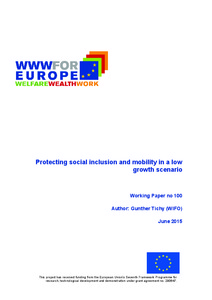Protecting social inclusion and mobility in a low growth scenario
"The unusually rapid economic growth during the second quarter of the previous century led to a marked reduction of sustained exclusion and discrimination against groups of persons. However, in the 1980s and 1990s, growth rates in industrialised countries began to drop; the different types of r...
| Main Authors: | , |
|---|---|
| Institution: | ETUI-European Trade Union Institute |
| Format: | TEXT |
| Language: | English |
| Published: |
Vienna
2015
WWWforEurope |
| Subjects: | |
| Online Access: | https://www.labourline.org/KENTIKA-19100110124919283929-Protecting-social-inclusion-an.htm |
| Summary: | "The unusually rapid economic growth during the second quarter of the previous century led to a marked reduction of sustained exclusion and discrimination against groups of persons. However, in the 1980s and 1990s, growth rates in industrialised countries began to drop; the different types of real and, more importantly, perceived social exclusion once again increased and became socially critical. The economic policy of the EU and its member states has, however, not dealt systematically with the problem of exclusion, instead addressing it only in isolated, individual steps, with the main focus being efficiency and the bolstering of growth. This, however, cannot be expected to take place to such an extent that a “trickle down” effect would automatically reduce exclusion; there must be an active and innovative anti-exclusion policy. This report attempts to outline which problems have been neglected in the WWWforEurope concept, for which problems solutions have been proposed, and for which problems solutions still need to be worked out." |
|---|---|
| Physical Description: | 57 p. Digital |

